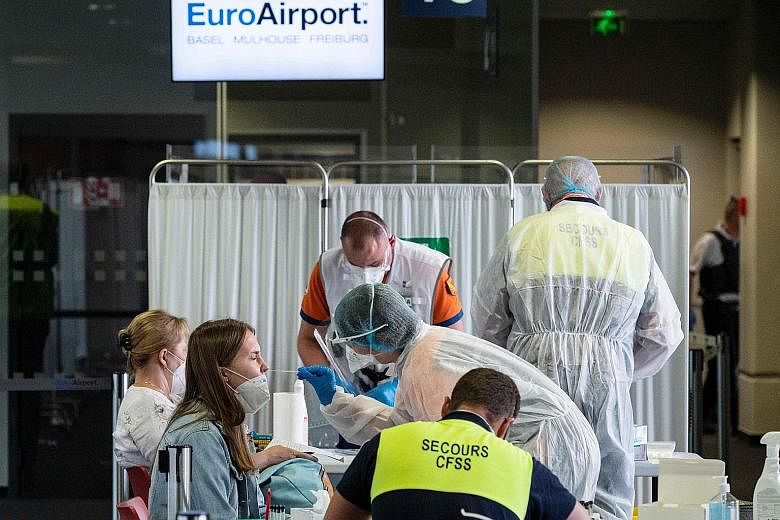BERLIN • More countries across Europe have imposed new travel restrictions and containment measures, with fears growing over a second wave of coronavirus infections as global deaths from the pandemic surged past 700,000.
This comes as the number of cases recorded worldwide passed 19 million, according to an Agence France-Presse tally from official sources at 7pm yesterday, Singapore time.
At least 19,133,340 cases and 715,343 deaths have now been registered globally.
The United States registered 4,883,657 cases and 160,104 deaths, while Brazil reported 2,912,212 infections and 98,493 deaths, making them the two worst-hit countries.
Still, Europe remains the hardest-hit region worldwide with more than 200,000 fatalities since the virus was first detected in China late last year, but the number of deaths is rising fast elsewhere, especially in Latin America and India.
Even as governments across the globe struggle to salvage economies ravaged by months of lockdowns, many have been forced to look at new measures to curb outbreaks of Covid-19 since they lifted initial containment orders.
Australia's second-largest city Melbourne entered the country's toughest lockdown yet on Thursday, closing non-essential businesses and requiring hundreds of thousands more people to stay at home in new regulations.
Germany is the latest to introduce mandatory tests for travellers returning from designated risk zones, starting today, as fears grow over rising case numbers blamed on summer holidays and local outbreaks.
Germany's list of "risk zones" currently includes most non-European Union countries, as well as certain provinces in Belgium and Spain.
Neighbouring Austria on Thursday announced it would issue a travel warning for mainland Spain, becoming the latest country to do so amid a rise in new coronavirus cases in the fellow EU nation.
Finland also introduced new controls on arrivals from some EU countries, including Belgium, the Netherlands and Andorra, putting a stop to tourists arriving from there and imposing a 14-day quarantine on other returnees.
"The situation is extremely delicate," said the Finnish Health Ministry's strategic director Liisa-Maria Voipio-Pulkki, adding that "some sort of second stage has begun". "Whether we can expect a smaller wave or a larger wave depends on how we respond."
Norway announced on Thursday that France would be considered a red zone due to the resurgence of coronavirus cases there, meaning that all travellers arriving from France face a mandatory 10-day quarantine.
Switzerland, Monaco and the Czech Republic were also hit with similar restrictions, as well as two Swedish regions, the Norwegian Foreign Affairs Ministry said.
"The infectious situation can change quickly, as can the res-trictions," Norwegian Foreign Minister Ine Eriksen Soreide said in a communique.
While much of Europe appeared to have brought the pandemic mostly under control with strict lockdowns earlier this year, many are seeing new outbreaks, forcing local or citywide lockdowns and other quarantine measures.
Poland will reimpose compulsory mask-wearing in all public spaces in nine districts, as it saw a record new high in the number of infections.
The restrictions will come into force from today, and will also affect sports and cultural events in those areas, mainly in the south and east.
Greece's government on Wednesday announced a "wake-up week" on Covid-19, tightening restrictions after the steady rise in mostly domestic infections. Officials have blamed the increase on overcrowding in clubs and social events.
Scotland this week already reimposed restrictions in and around the city of Aberdeen, after a cluster of cases was identified there.
The new outbreaks are forcing officials into an uncomfortable trade-off between health requirements and the need to bring economies back to life, as businesses and companies struggle with huge losses after initial lockdowns.
German airline giant Lufthansa became the latest to reveal the fallout from the pandemic, announcing forced layoffs and a €1.5 billion (S$2.4 billion) loss in the second quarter as the pandemic hit travel.
Announcing its worst quarter in the company's history, Lufthansa said that in the three months to June, its passenger numbers had collapsed by 96 per cent compared with last year as lockdowns curtailed air travel worldwide.
AGENCE FRANCE-PRESSE











